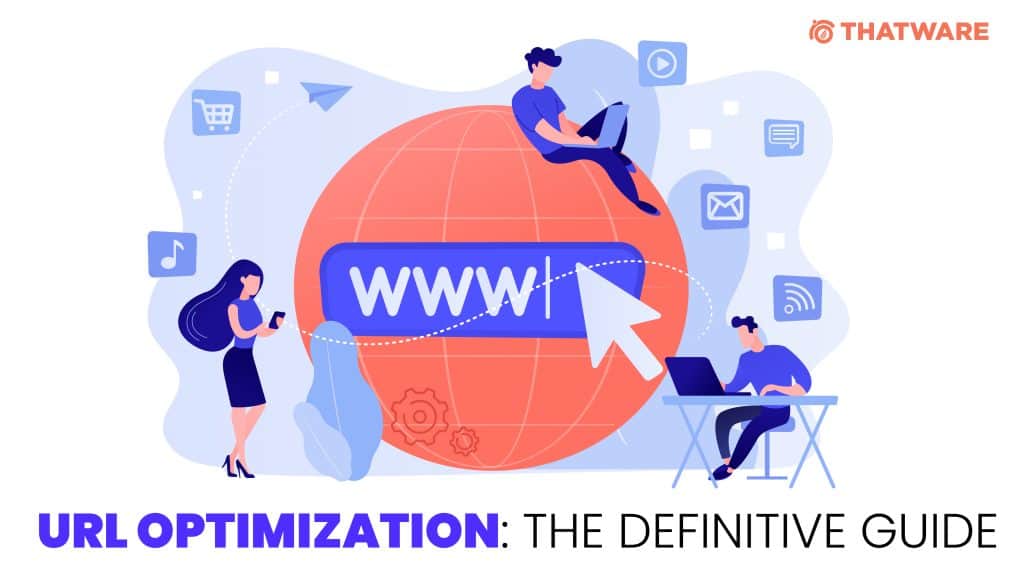Get a Customized Website SEO Audit and Online Marketing Strategy and Action
URL optimization is a critical yet often overlooked element of search engine optimization (SEO). A well-structured URL helps both users and search engines understand the content of your pages. URLs act as the gateway to your website, and optimizing them can significantly improve rankings, drive more traffic, and enhance user experience. This content explores the fundamentals of URL optimization and provides actionable insights to refine your website’s URL structure.
URLs are insignificant addresses to web pages for many people. However, how you opt for URL Optimization for SEO purposes is important.
URL optimization refers to the process of creating clear, concise, and meaningful URLs for your website pages. It is not just about aesthetics; it plays a pivotal role in helping search engines index your pages efficiently and boosting user engagement. When URLs are optimized correctly, they convey the page’s purpose at a glance, making navigation easier and improving visibility.
Although they may appear less significant than the title and header parts, URLs may be a valuable SEO strategy.

Why Is URL Optimization Important?
A good URL serves multiple purposes, from enhancing usability to improving your site’s overall performance in search results. Let’s explore some of the primary benefits:
- Improves User Experience: A clear and descriptive URL provides users with an idea of the content even before they visit the page.
- Boosts Search Engine Rankings: Search engines use URLs to understand a page’s context. Optimized URLs with keywords improve relevance and ranking potential.
- Increases Click-Through Rates (CTR): Clean, keyword-rich URLs are more enticing and encourage users to click on your link in search results.
- Simplifies Link Sharing: Short and straightforward URLs are easier to share and remember, driving more traffic to your website.
With these benefits in mind, it’s clear that optimizing URLs is essential for creating a strong online presence.
Essential Principles of URL Optimization
Optimizing URLs involves several best practices that can make a significant difference in your website’s performance. Let’s break them down:
Keep URLs Short & Descriptive
Short URLs are not only more user-friendly but also easier for search engines to process. Aim for brevity while ensuring relevance. For instance, a URL like example.com/seo-basics is better than example.com/everything-you-need-to-know-about-seo-basics-and-tips.
Incorporate Relevant Keywords
Keywords in your URL signal to search engines what the page is about. For example, if your content is about “vegan recipes,” an optimized URL could be example.com/vegan-recipes.
Use Hyphens to Separate Words
Hyphens improve readability and are recommended by search engines. Avoid underscores or spaces, as they can create confusion.
Maintain A Logical Structure
Your URL should reflect your website’s hierarchy and make navigation intuitive. For example, a category page URL might look like example.com/blog/seo-tips.
Avoid Dynamic Parameters
Dynamic URLs with long strings of numbers or symbols can confuse users and search engines. Instead, opt for static, human-readable URLs.
Stick to Lowercase Letters
URLs are case-sensitive, and using lowercase letters ensures consistency while avoiding potential errors during sharing or linking.
Therefore, by adhering to these principles, you can create URLs that are both functional and appealing.
Is It True That Keywords In Urls Are Used For Ranking?
There is no other solution if Google utilizes keywords in the URL for ranking. This is why.
In 2010, Google Advised Approaching URL Keywords As If You Were A User.
Matt Cutts of Google released a video in 2010 in which he addressed the differences between keywords in the pathname and keywords in the filename.
Cutts suggested tackling the problem from the perspective of the user.
Users may see the multi-hyphenated version as spammy, according to him.
He then confirmed that no multi-hyphen algorithm penalizes numerous hyphens, emphasizing the need to approach the problem from the user’s perspective.
In the following comment, Cutts indicated that there was a user impact effect.
Matt made no mention of the ranking element.
It can also be that he emphasized on the importance of user experience more than any other ranking factor.
In 2011, Google Said Keywords In The Domain Are Ranking Factors
He later said that Google was considering reducing the significance of keywords in the domain.
Keywords in domains, like keywords in URLs, were used as ranking criteria.
They were, however, minimized in terms of their importance.
Matt downplays their importance as a ranking criterion favouring other aspects such as user experience and marketing, just as he did with keywords in the URL.
In 2016, Google Claimed That Keywords Are A Minor Ranking Factor
John Mueller acknowledged that keywords in the URL were a ranking influence in a Webmaster Central hangout in January 2016.
Cutts has been stating that other site elements are essential to focus on, so calling it “extremely little” fits right in.
In 2017, Google Said Keywords In Urls Are Overrated
Mueller continues to downplay the significance of URL keywords as a ranking component.
He referred to them as “overrated” in 2017.
In 2018, Google Said Not To Worry About Keywords In URLs
Mueller continued to dismiss keywords in URLs as a ranking impact as recently as 2018, claiming that people don’t even notice them.
According to Googler comments, keywords in a URL may be a ranking influence, although it’s a minimal one.
Are Keywords In Bare URL Links Used As Anchor Text?
There’s a theory that if someone only links to your site, Google will at least utilize the keywords in the URL as anchor text, helping that site rank higher for that anchor text.
This type of link is described by the term ‘naked link’.
It is called a ‘naked link’ since it does not conceal itself within an anchor text, rather it’s in the form of an URL.
According to Mueller, naked links do not convey anchor text information (How Google Handles Naked Links, September 2020).
Can Keywords In A URL Help You Get More SERPS Clicks?
An old SEO theory suggests that including keywords in the URL can increase the click-through rate (CTR) from search results pages (SERPs).
In the past, this might have been true.
Today, this is less true, especially for sites that employ breadcrumb navigation and structured data from breadcrumb navigation.
For sites using breadcrumb navigation or breadcrumb navigation structured data, Google utilizes the category name in the search results.
The URL’s keywords are not displayed.
Google displays URLs with keywords for sites that don’t employ breadcrumb navigation or breadcrumb structured data.
However, Google does not highlight them.
It could have helped bring attention to the listing if Google had highlighted the terms in the URL, but that is not the case.
What Do Keywords In A URL Mean?
There are evident benefits to site visitors for keywords in a URL, aside from a very modest possible ranking factor weight.
Keywords in the URL can assist users in determining the purpose of a website.
Even though certain terms don’t always appear in the SERPs, they will when linked as a simple URL.
When in doubt, optimize for the user, as Google usually advises.
This corresponds to the kind of websites Google prefers to rank.
Best Practices For Your URL Structure
- Lowercase Your Urls To Make Them More Consistent.
Mixed case URLs aren’t a problem for most servers.
Even so, standardizing the appearance of your URLs is a smart idea.
It’s also a good idea to do that, if only because it’s what customers expect and it’s simpler to read than full capitals.
Maintaining consistency in your URLs will aid in the prevention of both internal and external linking issues.
- Instead Of Underscores, Use Hyphens.
Use hyphens(-) instead of underscores(_) since underscores are invisible when the URL is published as a bare link.
- In The Category URL Structure, Use Precise Keywords.
Choosing the term with the greatest traffic leads to a typical error of using a less relevant keyword as the category name.
The most popular term in a category isn’t always the same as the pages in that category.
Choose category titles that accurately represent the content of the pages inside them.
When in doubt, use the most relevant phrases for consumers searching for the information or goods found inside those categories.
- In URL Structure, Avoid Using Extraneous Words
CMS can help in adding the term /category/ into the URL structure.
This URL structure is unfavourable.
There is no need for a URL structure like /category/widget/ to exist.
It should be just /widget/.
Similarly, if there is a better term than “blog” for describing what people may anticipate from a portion of your site, use it instead.
Words direct users to the information they want.
Make proper use of them.
- Make Your URLs Future-Proof
Just because a date is in the article’s title doesn’t guarantee it should appear in the URL.
If you’re going to do a “Top xxx for 20xx” sort of post, it’s best to stick with the same URL year after year.
The advantage of upgrading the material and title year after year while maintaining the same URL is that all of the links to the prior year’s content stay active.
Following the old links, one can find the revised materials.
It’s also feasible to construct a prior year’s archive.
It’s all up to you.
Is It Better To Have A Trailing Slash Or Not?
This symbol represents a trailing slash: [/].
The Worldwide Web Consortium (W3C) is in charge of web standards. It suggests the use of a trailing slash in signifying a “container URL” for indicating parent/child connections.
(A URI is similar to a URL in that it identifies resources that aren’t necessarily on the internet.)
Parent/child connection refers to those categories that have a lot of pages.
The trailing slash in HTML indicates the presence of a directory or category section.
Apart from the home page, Google’s John Mueller tweeted in 2017 that a URL with and without the following slash are two separate websites.
Even in that 2010 blog post, Google left it up to publishers to determine how to utilize trailing slashes.
However, Google’s use of a standard trailing slash pattern supports this viewpoint.
Google Uses The Trailing Slash In A Variety Of Ways.
Yes, there are best practices, as the examples above demonstrate.
This is, however, one of those recommended practices that can be overlooked.
Google’s advice on the usage of trailing slashes varied as far back as 2010.
The essential thing to remember about trailing slashes in URLs is to pick one method and stick with it to minimize confusion.
It also makes redirecting non-trailing slash URLs to the trailing slash easier, and so on.
URLs for Search Engine Optimization
The subject of SEO-friendly URLs is more complicated than one may think, with several complexities.
While Google is gradually removing URLs from its SERPs, prominent search engines such as Bing and DuckDuckGo, continue to do so.
URLs are an effective technique for informing a potential site visitor about the content of a page.
Appropriate use of URLs can help in boosting click-through rates during link sharing.
Shorter URLs are also more user-friendly and easier to distribute.
Users are helping to popularize websites by making it easier to share them.
Please don’t underestimate the importance of popularity in search engine rankings because some search engines show users what they expect to see.
URL Optimization can make a huge difference in how well your page ranks even though they are a smaller and often forgotten aspect of SEO.
How to Optimize URLs for Different Website Types?
URL optimization varies depending on your website’s purpose. Here are tailored strategies for different types of websites:
- Blogs: Focus on short, keyword-rich URLs that summarize the content, like example.com/url-optimization-guide.
- E-commerce: Include product names and categories in URLs, such as example.com/electronics/smartphones.
- Portfolio Sites: Ensure URLs highlight your work, such as example.com/graphic-design-projects.
- Service Websites: Use descriptive URLs, like example.com/digital-marketing-services.
Each website type requires a slightly different approach, but the fundamental principles remain consistent.
Tools to Help with URL Optimization
Several tools can simplify the process of creating and managing optimized URLs:
- Google Search Console: Provides insights into how your URLs are performing in search results and highlights potential issues.
- Yoast SEO: Ideal for WordPress users, it offers suggestions to create SEO-friendly URLs.
- Ahrefs: Analyze your competitors’ URLs to identify gaps and opportunities.
- Screaming Frog: Detects broken links, duplicate URLs, and other technical issues that may hinder optimization efforts.
Using these tools ensures you have data-driven insights to improve your URL strategy.
Measuring The Success of Your URL Optimization
Once you’ve implemented URL optimization strategies, it’s essential to monitor their impact. Here’s what to track:
- Organic Traffic Growth: An increase in traffic to pages with optimized URLs indicates better visibility in search results.
- Bounce Rates: Lower bounce rates suggest that users find the content relevant and aligned with their expectations from the URL.
- CTR (Click-Through Rate): Improved CTR reflects the effectiveness of your URLs in attracting clicks.
- Page Rankings: Higher rankings for targeted keywords indicate that your optimization efforts are paying off.
Regularly analyzing these metrics ensures your URLs remain effective and aligned with your overall SEO goals.
Final Thoughts
URL optimization is a powerful yet often underutilized strategy for improving your website’s SEO and user experience. Therefore, by creating clean, concise, and keyword-rich URLs, you make your content more accessible to both users and search engines. Avoid common pitfalls, follow best practices, and leverage available tools to enhance your URL structure effectively.
Ultimately, a well-optimized URL is the foundation of an SEO-friendly website, making it easier for users to find and engage with your content. Invest time in refining your URLs today, and you’ll reap long-term benefits in visibility, traffic, and rankings.

Thatware | Founder & CEO
Tuhin is recognized across the globe for his vision to revolutionize digital transformation industry with the help of cutting-edge technology. He won bronze for India at the Stevie Awards USA as well as winning the India Business Awards, India Technology Award, Top 100 influential tech leaders from Analytics Insights, Clutch Global Front runner in digital marketing, founder of the fastest growing company in Asia by The CEO Magazine and is a TEDx speaker and BrightonSEO speaker.

